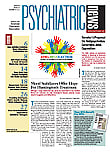Maybe he was just lucky, but Ryan Bell, M.D., J.D., found what he called the “perfect job” right out of residency two years ago, running a publicly funded outpatient clinic in Rochester, N.Y., for hard-to-treat patients.
“It’s easier if you know what you want to do,” Bell told listeners, most of them residents, at APA’s Institute on Psychiatric Services in San Francisco in October.
And what Bell wants to do is psychotherapy along with the administrative work.
“You feel like you’ve got some control over what’s going on in your clinic,” he said.
The Steve Schwarzkopf Community Mental Health Center takes on patients with serious mental illness and at least two other major challenges to daily living. Many have been rejected by other clinics because they have had difficulty remaining connected with clinical services.
“We treat patients who can’t be treated elsewhere,” he noted.
Patients under restraining orders or who have trouble showing up for appointments or who have just left one of New York’s state psychiatric hospitals are welcomed in the clinic.
Bell’s wraparound approach to these patients uses a variety of services as “hooks” for patients not initially interested in mental health services. At the moment, he is the only psychiatrist at the center but he has the OK to hire another. His staff also includes a part-time psychiatric nurse practitioner, an occupational therapist, social workers, and an educational specialist. The team tackles whatever problems the patients face.
If patients have been evicted, the staff finds housing. If they’ve been arrested, the staff looks into the possibility of mental health court involvement. Team members may arrange for care of general medical problems or enroll the patient in the food-stamp program.
Addressing those concrete needs clears out obstacles and makes the patient more likely to remain in care. “Our mission is to engage people not previously engaged in treatment, keep them engaged, and deliver better care with concrete, measurable outcomes,” said Bell.
The key to the clinic’s approach is outreach.
Bell and his staff are frequently on the road, going to where their patients reside or hang out. The street work lets the staff see how patients live and learn where the gaps and barriers to services lie.
“Sometimes our services happen in the clinic, but more than half the time they occur in the community,” he said in an interview with Psychiatric News. “We have drawn blood at kitchen tables, given injections in living rooms, done family counseling in unheated apartments in the dead of winter, tracked clients down sleeping in dumpsters or hanging out in the parking lot of Dunkin’ Donuts, and followed them into hospice care. Our promise is to walk beside them, wherever that may lead.”
His own meetings with patients, wherever they occur, aren’t just 15-minute med checks. He spends a minimum of 30 minutes, in or out of the clinic, doing psychotherapy.
Most of the clinic’s patients are covered by a managed-care Medicaid plan that provides quarterly capitated payments and allows for greater flexibility in care than fee-for-service systems.
He knows the state bureaucrats in Albany want hard numbers, so he set up the clinic to provide them. He wants to show that the clinic’s services can reduce hospitalizations and arrests, improve metabolic outcomes, and maybe even increase life expectancy for a statistically short-lived population.
He has tried to set up a co-located general medical clinic, but so far without success. To make that point in the future, he documents how many of his patients go to area emergency rooms for nonpsychiatric medical visits. So far, the clinic’s approach has cut emergency visits by 27 percent, he said.
He cited as an example one patient diagnosed with Type 1 diabetes who because of his schizophrenia refused to control his diet or stick to his insulin regimen. Psychiatric treatment for such patients could directly affect their ability to manage their physical health problems, he pointed out.
The clinic’s work has reduced inpatient psychiatric admissions by 50 percent and incarcerations by 32 percent, he said.
Now the real trick will be sustaining those numbers.
“Brilliant programs arise, but then the funding dries up and you get pushed for higher patient loads,” said Bell. “But you don’t want to ‘water down the whisky,’ as my granddad used to say.”
At the end of his talk, Bell suggested to his audience that they should consider the joys of community psychiatry and of taking on at least part of the administrative burden in their future careers.
“Administrative stuff is fun,” he said. “It gives you a sense that you are controlling the vision of the organization. You’re not just being pushed around. You have a mission; your vision is being realized. Ask for administrative work and you will have more job satisfaction and your patients will have better outcomes.”


